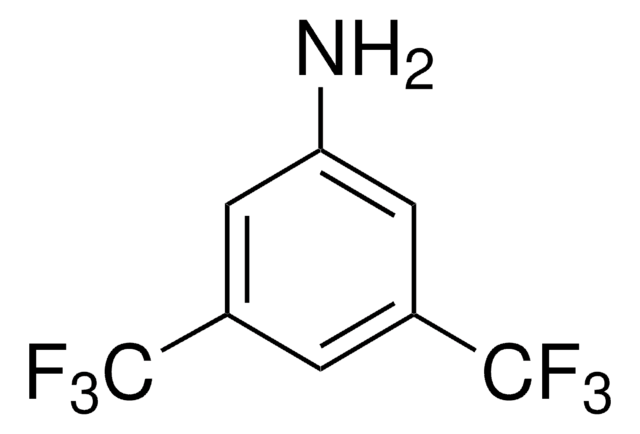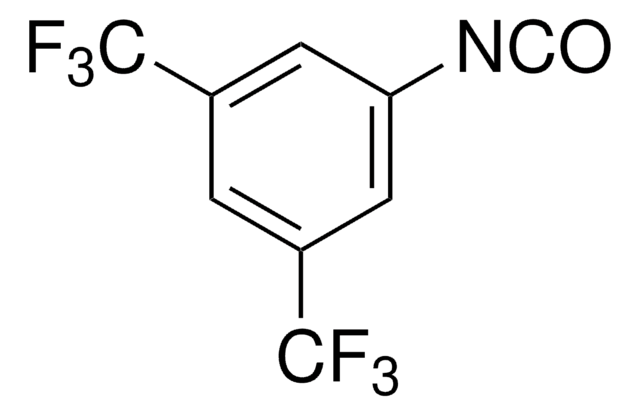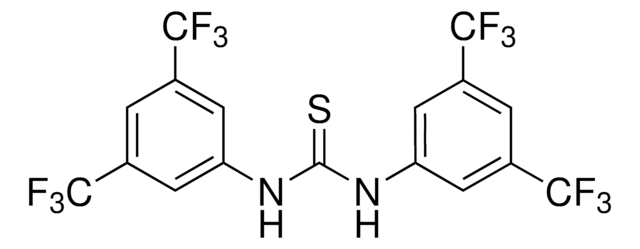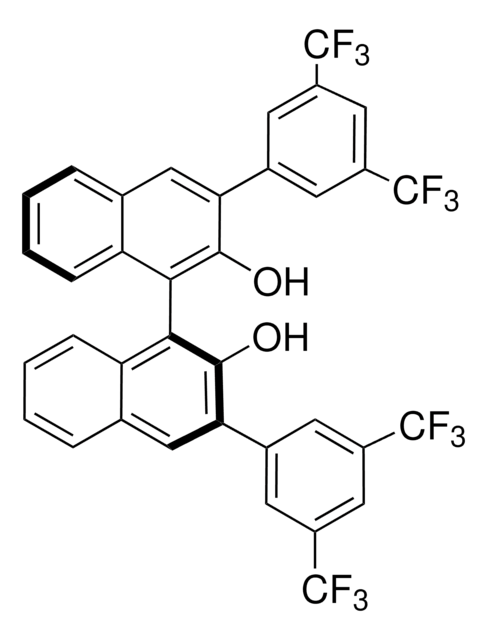904805
((S)-3-(3,5-Bis(trifluoromethyl)phenyl)-1-(2′-(3-(3,5-bis(trifluoromethyl)phenyl)ureido)-[1,1′-binaphthalen]-2-yl)-1-isopropylurea
≥95%
Synonyme(s) :
Gouverneur fluorination catalyst
About This Item
Produits recommandés
Essai
≥95%
Forme
powder or crystals
Pf
144-160 °C
Chaîne SMILES
FC(F)(F)c1cc(cc(c1)C(F)(F)F)NC(=O)N(C(C)C)c2c(c6c(cc2)cccc6)c3c4c(ccc3NC(=O)Nc5cc(cc(c5)C(F)(F)F)C(F)(F)F)cccc4
InChI
1S/C41H28F12N4O2/c1-21(2)57(37(59)55-29-19-26(40(48,49)50)16-27(20-29)41(51,52)53)33-14-12-23-8-4-6-10-31(23)35(33)34-30-9-5-3-7-22(30)11-13-32(34)56-36(58)54-28-17-24(38(42,43)44)15-25(18-28)39(45,46)47/h3-21H,1-2H3,(H,55,59)(H2,54,56,58)
Clé InChI
VKRWLTPTRNIRGQ-UHFFFAOYSA-N
Application
Automate your fluorination reactions with Synple Automated Synthesis Platform (SYNPLE-SC002)
Produit(s) apparenté(s)
Code de la classe de stockage
11 - Combustible Solids
Classe de danger pour l'eau (WGK)
WGK 3
Point d'éclair (°F)
Not applicable
Point d'éclair (°C)
Not applicable
Faites votre choix parmi les versions les plus récentes :
Certificats d'analyse (COA)
It looks like we've run into a problem, but you can still download Certificates of Analysis from our Documents section.
Si vous avez besoin d'assistance, veuillez contacter Service Clients
Déjà en possession de ce produit ?
Retrouvez la documentation relative aux produits que vous avez récemment achetés dans la Bibliothèque de documents.
Notre équipe de scientifiques dispose d'une expérience dans tous les secteurs de la recherche, notamment en sciences de la vie, science des matériaux, synthèse chimique, chromatographie, analyse et dans de nombreux autres domaines..
Contacter notre Service technique![(R)-N-[(1R,2R)-2-(3-(3,5-Bis(trifluoromethyl)phenyl)ureido)cyclohexyl]-tert-butyl-sulfinamide 96%](/deepweb/assets/sigmaaldrich/product/structures/389/070/18847164-c6a7-4b4e-abcb-2dbc22493a2d/640/18847164-c6a7-4b4e-abcb-2dbc22493a2d.png)
![1-[3,5-bis(trifluoromethyl)phenyl]-3-[(1R,2R)-(-)-2-(dimethylamino)cyclohexyl]thiourea AldrichCPR](/deepweb/assets/sigmaaldrich/product/structures/236/021/d944889d-2233-4700-9f2c-caa3652d0124/640/d944889d-2233-4700-9f2c-caa3652d0124.png)
![N-[(1R,2R)-2-(1-Piperidinyl)cyclohexyl]-N′-[4-(trifluoromethyl)phenyl]squaramide 95%](/deepweb/assets/sigmaaldrich/product/structures/238/480/7149c9c0-8769-418a-a96c-77c15dd50cd0/640/7149c9c0-8769-418a-a96c-77c15dd50cd0.png)
![(S)-2-[[3,5-Bis(trifluoromethyl)phenyl]thioureido]-N-benzyl-N-3,3-trimethylbutanamide 97%](/deepweb/assets/sigmaaldrich/product/structures/373/888/118b46f2-6c2e-4a87-8266-c4dbcd5db51f/640/118b46f2-6c2e-4a87-8266-c4dbcd5db51f.png)
![Poly[(9,9-di-n-octylfluorenyl-2,7-diyl)-alt-(benzo[2,1,3]thiadiazol-4,8-diyl)] average Mn ≤25000](/deepweb/assets/sigmaaldrich/product/structures/428/661/1c4ebb98-9d51-48c0-96c7-e556ca425aa4/640/1c4ebb98-9d51-48c0-96c7-e556ca425aa4.png)



